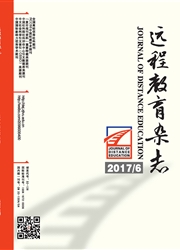

 中文摘要:
中文摘要:
《2014地平线报告(高等教育)》指出,社交媒体的使用将成为未来1-2年内改变高等教育快速发展的一种趋势。目前许多研究普遍表明,学生在使用社会软件学习时,教学效果普遍得到提高,但在社会软件教学实验中发现,学生使用的积极性和投入度并不高,学习共同体并没有自然而然地产生。通过采用与学生的深度访谈方法,分析了社会软件学习积极性欠缺的原因,归纳出八条主要原因并提出改进建议。教师要将社会软件平台上的教学表现纳入学生成绩评价体系中,并基于SOLO(可观察的学习成果结构)理论,给出了博客、微博、QQ三种社会软件的学习质量评价标准,以明确社会软件使用的目的,供教师和研究者借鉴,期望能促进社会性学习与正式学习的融合,顺应数字化无缝学习的新发展。
 英文摘要:
英文摘要:
The Horizon Report:2014Higher Education Edition pointed out that social media had become a tool to make higher education develop quickly in one to two years. Many studies have shown that teaching effectiveness have been improved when stu-dents learn by social software. But the author's teaching experiment results found that the students ’ enthusiasm in learning social software was not high, so the learning community was not naturally produced. In-depth interviews with students were used in the pa-per to analyze the reasons why learners lack enthusiasm in learning social software. Eight main reasons were summed up and specific recommendations for improvement were also given. To encourage students to use social software and ensure learning quality, teachers have to make learning performances on social software platforms as a part of students ’ grade evaluation system. Based on SOLO, eval-uation standards for three kinds of social software (blog, weibo, QQ) are provided, so that the aim of using social software can be cleared, which can not only provide enlightenment for the teachers and researchers, but also make an inte gration of social learning and formal learning to meet the development of seamless digital learning.
 同期刊论文项目
同期刊论文项目
 同项目期刊论文
同项目期刊论文
 期刊信息
期刊信息
